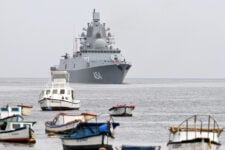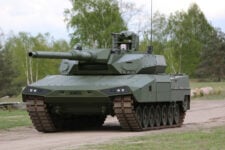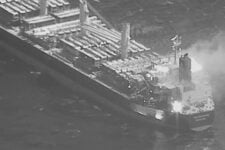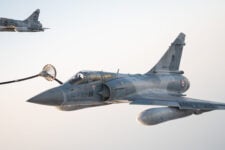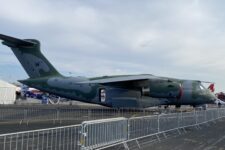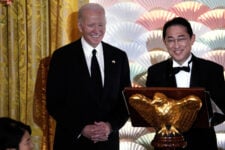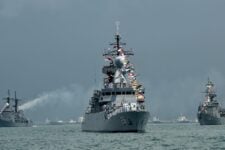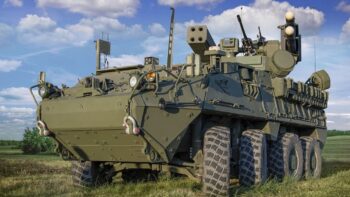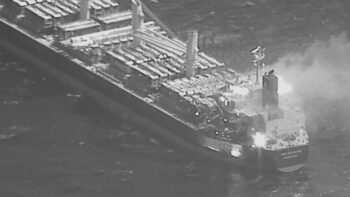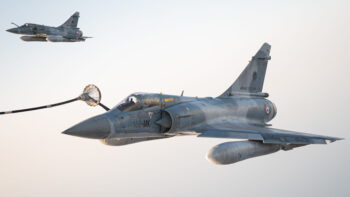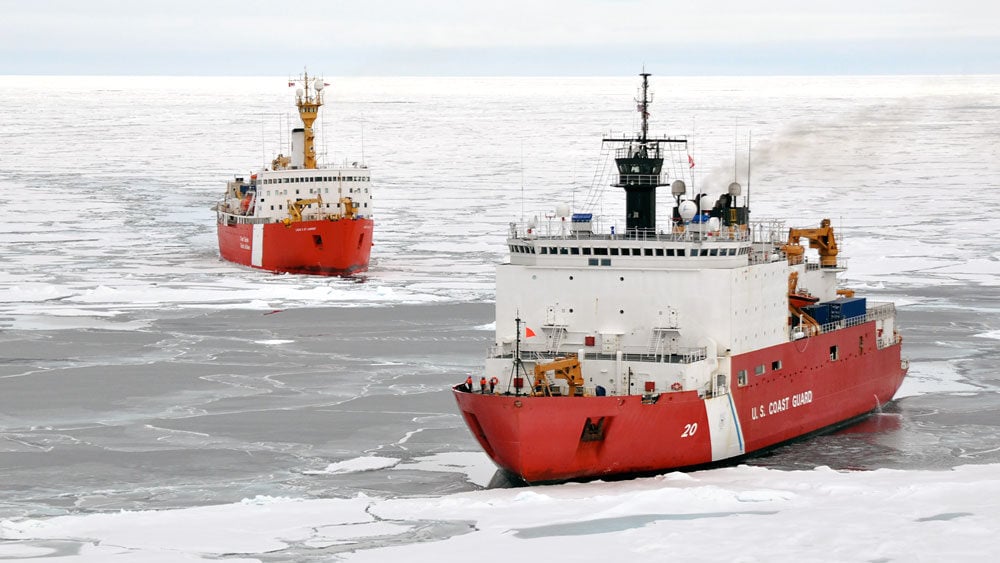
A Canadian Coast Guard vessel rendezvous with US Coast Guard icebreaker Healy (foreground) in the Arctic. (US Coast Guard/Patrick Kelley)
The Arctic may be the single region most subject to competition for resources and new trade routes being made possible by climate change, with Russia and China pressing ahead on construction of ice breakers, sailing in areas previously untouched by them. In this new op-ed, two regional experts call for the creation of a northern Pacific Quad, comprising the US, Canada, Japan and South Korea, to offer a check on what they call the “revisionist autocratic powers.”
While cooperation among NATO countries and the Arctic seven has been well-established to protect the Northern Atlantic Arctic from Sino-Russian military activities, the northern Pacific lacks a regional security architecture and remains a critical vulnerability for the United States and Canada.
Luckily, there are two nations in the northern Pacific that share close ties with Washington and Ottawa. As the Arctic emerges as the next frontier for great power rivalry, the United States, Canada, Japan, and South Korea should band together to uphold the rules-based order and to check the growing influence of Russia and China in the High North.
This nascent multilateral partnership involves four democratic allies united by shared values and concerns over the militarization of the Arctic by revisionist autocratic powers.
After the invasion of Ukraine, Russia pivoted toward China in search of new economic partnerships to mitigate pressures from sanctions extending to the Arctic. Proprietary data reveals a startling surge in Chinese economic activity, with an 87 percent increase in the number of PRC-owned companies registered in Russian-controlled arctic territory from January 2022 to June 2023, compared to the two full years prior.
During these 18 months, 234 Chinese-owned firms registered operations in the region — an escalation that has helped Moscow circumvent sanctions while advancing Beijing’s longstanding regional ambitions.
China’s Arctic investments were already viewed warily by other regional states due to perceptions of “debt-trap diplomacy” as a lever for gaining strategic influence. Analysts highlight how Beijing’s efforts toward the Greenland airport project and Icelandic land acquisitions foreshadowed such concerns.
Last August, 11 Chinese and Russian warships, as part of a joint naval exercise, sailed perilously close to the US-held Aleutian Islands off the Alaskan coast — a deliberate challenge to American dominance. Ottawa has detected Chinese espionage assets operating in sovereign Arctic waters. Analysts argue that these buoys could have been utilized to map the seabed, monitor ice thickness and monitor submarine activity.
Adding to this, a 2023 pact between the Russian and Chinese coast guards raises fears of creeping militarization in the north Pacific under the guise of commercial activities.
The Arctic Quad’s Collective Strength
To counter these escalating dangers, the US and Canada should turn to Japan and South Korea — two pivotal treaty allies with strategic interests and unique capabilities that could bolster Arctic security.
First, the two countries’ engagement can significantly bolster the defense capabilities of the alliance. Tokyo has been playing a leadership role in promoting maritime security norms and environmental stewardship. By lending its world-class ocean radar and remote sensor technologies — refined over decades by heavy reliance on fishing and regular confrontations with natural disasters — Japan can significantly enhance Canada’s monitoring capability. The Canadians recently announced a plan to invest $1.4 billion over 20 years to improve Arctic maritime sensors.
South Korea, a shipbuilding titan that outcompetes China, may hold the key to accelerating the modernization of aging allied Arctic maritime fleets. Plus, as Canada has vowed to spend $18.4 billion over 20 years to acquire a more modernized tactical helicopter capability in the Arctic, South Korea with its advanced arms manufacturing can help there too.
Such deeper defense-industrial collaboration would fortify Arctic security architectures while deepening military interoperability. Moreover, pooling efforts within multilateral governance bodies would enable the US-led democratic coalition to collectively shape the north Pacific. Coordinating positions in forums like the Arctic Council and Trilateral Summit between Japan, South Korea and China would safeguard their converging interests as the Arctic’s future contours are determined.
What about the benefits to Tokyo and Seoul?
South Korea had been heavily reliant on Russia in implementing Arctic developmental projects before the Ukraine war, and now needs to find other options. The burgeoning military alliance between Russia and North Korea — including arms transfers and potential missile technology-sharing — poses unacceptable risks. Russia’s reliance on Pyongyang amid its international isolation renders continued cooperation with Moscow untenable for Seoul.
Concurrently, the deepening Sino-Russian axis fueled by Beijing’s tacit backing of the Ukraine invasion portends long-term dangers for Japan. From Tokyo’s perspective, Chinese economic encroachment into the Russian Arctic represents the leading edge of a broader expansionist agenda that could fatally undermine Japan’s regional security down the road.
Given these factors, all four countries should come to realize that formal and robust coordination between like-minded states is needed. Even when direct military provision may be unfeasible, Seoul and Tokyo can still contribute through defense cooperation focused on areas like maritime security and cold-weather operations — signaling a commitment to deter unilateral aggression without violating the Arctic’s fragile ecosystem.
With climate change rendering the Arctic’s resource wealth more accessible, the window to cement a rules-based regional order is narrowing rapidly. Left uncontested, the Sino-Russian blueprint to remold the High North as an authoritarian sphere of influence could become reality.
For nations upholding the liberal international order, forging a democratic Arctic alliance is an existential necessity. Its success or failure will reverberate globally as an example of whether revisionist autocracies can be held in check.
Chan Mo Ku is a former military officer at the Strategic Planning Directorate of the Republic of Korea – United States Combined Forces Command. Chan Mo received his MA from the Johns Hopkins School of Advanced International Studies and BA from King’s College London.
Jinwan Park is an incoming Schwarzman Scholar at Tsinghua University, China, and an East-Asia-focused researcher with works published in numerous publications including Nikkei Asia, CSIS, South China Morning Post, The National Interest, and Asia Unbound.

